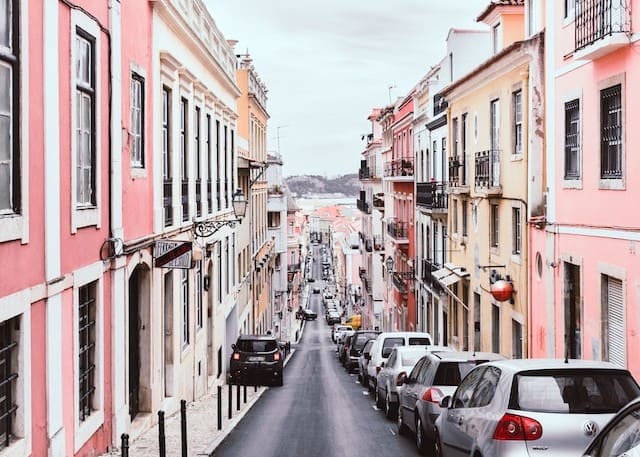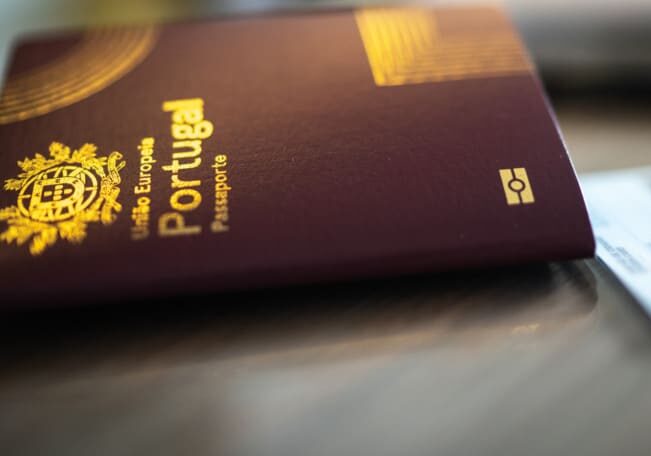Updated: December 9, 2025
Lisbon is a top choice for digital nomads, expats, and retirees looking to set up a new life. The warm weather, high quality of life, and old beauty of the city have attracted many foreigners from different walks of life to move to Lisbon in the past years. So, if you are considering moving to Lisbon, Portugal, yourself, then we’ve got you covered.
You should know a few key things before moving to Lisbon in 2025. For example, you will need to understand the expected cost of living in Lisbon and which neighborhood will suit your needs. You will also need to decide which visa is best for you, whether it be the D8 Visa for digital nomads or the D7 Visa for retirees and passive income earners.
In this article, we provide some key information to make the process of moving as easy as possible, from the pros and cons of living in Portugal’s capital to the cost of living in Lisbon and the best neighborhoods.
Why move to Lisbon?

So, first things first. Why Lisbon? Well, the capital of Portugal, perched on seven hills, ticks all the boxes. With a great climate, friendly locals, affordable quality of life, and excellent gastronomy, it is with good reason that the capital of Portugal has become one of the best places to live in recent years.
Factor in world-class education facilities, good healthcare, pristine beaches within striking distance from the city center, and the buzz of the city itself, there’s not much that Lisbon doesn’t deliver on.
With the beautiful Tagus River and the 25 de Abril Bridge (reminiscent of the Golden Gate Bridge and Oakland Bay Bridge, both of which can be found in San Fransisco) stretched out before you, plus several miradouros (viewpoints) to admire the city from, you’ll quickly come to realize that there is nowhere quite like Lisbon.
Take a closer look at more of the pros and cons of living in Lisbon before getting into the practical steps for how to move to Lisbon:
Pros of living in Lisbon:
- A beautiful old city with there being plenty of things to do in Lisbon
- Great weather through most of the year
- Great fresh fish and seafood
- Vibrant nightlife and social scene
- Low cost of living in Lisbon
- Portugal is a very safe country, ranking seventh in the 2024 Global Peace Index
- Warm and welcoming expat network
- Portuguese nationals are friendly and accommodating
- An array of beautiful beaches, such as Costa da Caparica and Carcavelos, with opportunities to surf
- Excellent schools in the center of the city and the wider Lisbon area
- Good business opportunities
Cons of living in Lisbon:
- Portuguese bureaucracy can be slow and difficult to navigate alone
- Learning basic Portuguese can be tricky for some
- Some properties do not have central heating, so it can get cold in the winter months
- Overtourism in the summer months
- Challenge to find a property to rent, and Lisbon rents can be priced high
What to Consider Before Moving to Lisbon
As with moving to any country, there are certain things that you’ll need to bear in mind. In this part of our article, we’ll provide you with some key essentials that you should consider.
It can be hard to find a place to live
Lisbon is a hot real estate market, and therefore, finding a place that fits your requirements is no small feat. It’s also not easy to know whether the place you have chosen is priced correctly for the area, has a good value per square meter, and is in a safe and prosperous neighborhood.
There are hundreds of properties out there in the Lisbon market, and looking online can seem like a minefield. This is where seeking expert advice from a buyer’s agent like Goldcrest comes in. Buyer’s agents are experts who can help you navigate Lisbon’s real estate market effortlessly and find your dream Portuguese home.
The local job market might not pay so well
Portuguese salaries are considerably lower than those of the USA, the UK, and many other EU countries. Many expats move to Portugal and work remotely from their home country, which means their salary goes a lot further. Companies embracing remote work have further enhanced interest in expats moving to Portugal, as there is more flexibility with workers able to work from anywhere.
With this said, Lisbon has become a tech capital in its own right, with many international startups and tech companies now calling Portugal home. This is exemplified by Web Summit, the largest tech festival in the world, which relocated to Lisbon in 2016.
This new entrepreneurial buzz in the city brings with it many new opportunities for foreign residents looking for work in the city. There is now an abundance of world-class co-working spaces that can be found in Lisbon.
Cost of living in Lisbon
Consider the cost of living in Lisbon and your income needs before moving. Lisbon offers a high quality of life at a generally lower cost of living than many other Western European capitals—although, do bear in mind that this city is not quite as cheap as it once was. Prices have been rising steadily, especially in housing. Still, day-to-day expenses like food and public transport remain budget-friendly.
In Lisbon, you can eat and drink wonderfully at a relatively low cost. A beer costs less than a euro in a lot of places, and the same goes for coffee. Of course, since Lisbon currently holds the title of Europe’s Best Culinary City – as crowned by the World Culinary Awards– there is an up-market dining scene, too. However, the prices in these establishments are still low for the quality of the offerings you can have.
Rents are high in Lisbon. If you are in a position to buy, it’s a smart financial move to do so. With any hot property market and popular holiday destination, there are always benefits to buying a house in Lisbon rather than competing for rental apartments.
Considering all the daily living costs discussed, below is an example of what you can expect to pay for the essentials while living in Lisbon:
1 liter of milk | €1.01 |
Loaf of fresh bread | €1.58 |
1 dozen eggs | €3.24 |
1 kg of rice | €1.44 |
1 kg of chicken fillets | €6.97 |
1.5 liter bottle of water | €0.73 |
1 kg of local cheese | €10.75 |
1 kg of apples | €1.87 |
1 kg of potatoes | €1.59 |
1 bottle of mid-range wine | €5.00 |
Basic utilities (electricity, heating, cooling, water, garbage) for 85m2 apartment | €137.93 |
Internet | €31.83 |
Monthly rent for an apartment (1 bedroom) in city center | €1,375.93 |
Monthly rent for an apartment (1 bedroom) outside of center | €1,039.58 |
The quality of life in Lisbon is fantastic

Portugal is an amazing country rich in culture and tradition that has year-round warm weather, stunning beaches, and an abundance of fresh fish.
These qualities make for a fantastic quality of life, and it’s not surprising that Portugal is consistently voted as a top choice for people looking to move abroad. If you are looking to retire in Lisbon, the city is also known to be one of the best places to enjoy your golden years in style.
Portugal ranks sixth in the Global Citizen Solutions Quality of Life Index, outranking countries like New Zealand, Canada, and the UK. This highlights why so many expats move to the country to improve their lifestyle, with Lisbon remaining a top choice.
Strong expat network
The expat community in Lisbon is warm and welcoming to newcomers. The growing group of foreigners in Lisbon is thriving and has further come to life following the trend of remote workers heading to the Portuguese capital. There are regular meetups for expats and digital nomads that take place in various places across the city, making living here very easy.
Living in Lisbon, you should easily be able to form a strong network of friends quickly, with there being many activities to get involved in, from yoga to cooking classes and from golf to water sports activities.
Bureaucracy and dealing with language barriers
There is naturally a bit of bureaucracy to deal with when moving to Portugal, such as registering at the local town hall, getting a NIF (Portuguese tax number), and setting up a bank account.
However, the process can be slow. Making sure you have all the required documents with you will significantly speed up the process.
Living in Lisbon, you will find English is widely spoken and the language barrier should not be much of a problem. Most locals will be able to assist you, with many even going out of their way to help you on your way, from providing you with restaurant recommendations to helping you learn Portuguese.
Real Estate in Lisbon

The Lisbon property market has moved from strength to strength over the years, with foreign buyers from across the globe investing in property in Lisbon. Property in Lisbon continues to show impressive resilience, combining strong long-term growth and stable rental yields with increasing international demand.
In Lisbon city, the average asking price for property stood at €6,934 per square meter in 2024. If you look at Greater Lisbon, this is reduced to €4,935 per square meter. Note that the purchase piece can be higher or lower than the asking price, so keep this in mind when negotiating with the seller.
Real estate investments in Lisbon can be a smart move, but, as you can see, in the capital itself, housing prices are much steeper than in the surrounding area. Even in Lisbon city itself, different neighborhoods have different price ranges, with the more expensive neighborhoods generally being those close to the city center. However, compared to other countries in Western Europe, you will still find them quite affordable.
Our guide to buying property in Portugal will arm you with the step-by-step buying process, the options to open a Portuguese bank account, where the best places to buy in the country are, plus key information on taxes, fees, and financing your property.
Finding Your Home in Lisbon: Working with a Realtor Versus a Buyer’s Agent

When relocating to Lisbon and looking for your new home, seeking expert help is always a good idea. Realtors in Portugal can help you find unique properties and streamline your search, but keep in mind they work for the seller and may prioritize higher commissions over impartial advice.
A buyer’s agent brings impartiality to the process by working exclusively for you, the buyer.
They search both on- and off-market listings to find properties that match your needs. They also assist with negotiations, recommend trusted professionals, and provide thorough property comparisons based on local housing market data.
Which part of Lisbon should I move to?
Deciding which part of Lisbon to live in can be the most difficult aspect of moving. We recommend visiting Lisbon a few times to discover the different neighborhoods before settling on a particular part of the city.
You’ll quickly find that each neighborhood of the city has its own character, its own pros and cons, and one may be better suited to what you are after than another. Below are some of the more popular neighborhoods to consider, but our complete guide to the best neighborhoods in Lisbon will offer an in-depth look into more of Lisbon’s top neighborhoods.
- Campo do Ourique, Parque das Nações, and Estrela: These are quieter neighborhoods that are perfect if you asking yourself where to live in Lisbon with your family or are a retiree looking for a peaceful escape with modern amenities.
- Baixa, Chiado, Príncipe Real, and Anjos: Lively and vibrant neighborhoods that are great for digital nomads and young people. These neighborhoods offer excellent cafés, coworking spaces, vibrant nightlife, and walkability.
- Alfama, Graça, and São Vicente: These neighborhoods have a more historic feel, great for culture lovers and creatives. Alfama is Lisbon’s oldest neighborhood, full of charm, narrow alleys, Fado music, and a deep sense of history. Graça and São Vicente offer character-rich homes and stunning viewpoints.
When choosing a place to stay, expats also look to the Greater Lisbon area, away from the city center. Lisbon’s surrounding areas offer more affordable options, larger properties, and unique cultural and historical surroundings that many expats moving to Lisbon prefer.
Greater Lisbon

As with almost every other metropolis in the world, moving to Lisbon does not necessarily mean moving to the city center. Greater Lisbon is large and varied, and there are many excellent neighborhoods in the surrounding area to consider if you want to move to the capital.
The steady influx of people heading to the city means that almost 27 percent of Portugal’s population lives in the Lisbon Metropolitan Area. This area is more than five times as populous as its hub, with roughly three million inhabitants. The largest of these municipalities include Amadora, Cascais, Loures, Sintra, Seixal, and Almada.
Almada real estate can provide investors with an up-and-coming part of Portugal, with rental yields standing at 6.6 percent in 2024. If you are looking for top locations outside of the hustle and bustle of central Lisbon, consider the surrounding areas.
Sintra

Sintra Portugal real estate is a hot topic at the moment and is considered one of the most romantic places in the country, where you are in the depths of nature while still being conveniently located to get around. Sintra has an ageless charm and a rich history, being the homeplace of the Portuguese nobility in its day.
Situated in the Natural Park of Sintra and Cascais, if you are into the great outdoors, this could be the perfect spot for you. Plus, with many stunning, quiet beaches hugging the coastline, you can enjoy the views of the Atlantic coast whenever it takes your fancy.
For families moving to Portugal, you should find some excellent international schools in Lisbon and close by. An excellent international school very close to Sintra is the Carlucci American International School of Lisbon, which follows the American curriculum.
Sintra is one of the best places to bring up a family. As you are just 30-40 minutes away from Lisbon, you have the best of both worlds – the buzzing city and the sublime countryside, with some beautiful beaches thrown in for good measure.
Cascais
Cascais Portugal real estate has long been on the radar of Lisbon expats. This beach resort is less than an hour by train from Lisbon and around 30 minutes by car. With fabulous beaches, a relaxed ambiance, and activities galore, Cascais offers the finer things in life.
Similar to Sintra, Cascais is also a very good area for families as there are excellent international schools close by. Examples include Park International School, St António International School, St John’s International School, and the International Christian School of Cascais.
If you are moving to Lisbon, you will also find that a little bit out of the city, you will benefit from more spacious properties. Many homes here will have a private swimming pool, security, or a private gym. Feel free to consult with a real estate agent in Lisbon to research different property types, such as apartments and luxury villas.
Lisbon is also one of the best cities to move to for LGBTQI+ expats, being a welcoming and accepting city. Find out about the best gay areas in Lisbon.
How to Move to Lisbon from the USA
 If you are moving to Lisbon from the US, you’ll find that the cost of living, from daily essentials and transportation to healthcare and eating out in restaurants, is much more affordable than in the USA. You will likely be pleasantly surprised when comparing Lisbon to your own city or town in the US. Consumer prices are around 45 percent lower in Lisbon than in San Francisco.
If you are moving to Lisbon from the US, you’ll find that the cost of living, from daily essentials and transportation to healthcare and eating out in restaurants, is much more affordable than in the USA. You will likely be pleasantly surprised when comparing Lisbon to your own city or town in the US. Consumer prices are around 45 percent lower in Lisbon than in San Francisco.
If you are moving to Lisbon from the US or any other country outside the EU, you will need a residence visa and residence permit. Residency in Portugal can be granted to those working, studying, or marrying a Portuguese citizen. The Digital Nomad Visa, for remote workers earning a specific income, and the D7 Visa, for those with passive income, are also options for those who meet the requirements. Alternatively, the Portugal Golden Visa program, with investment options like supporting cultural heritage or investing in local businesses, can also lead to a residence permit.
Portugal Golden Visa
The Portugal Golden Visa is an excellent program that allows for residence permits through investment. Investment options for the Golden Visa include supporting cultural heritage (€250,000 minimum investment) or investing in local businesses, research activities, or investment fund shares (€500,000 or more). The fund investment option is popular and typically returns funds after six to ten years.
Portugal D7 Visa
If you do not want to make a significant investment but you earn a passive income that can sustain you while living in the country, then the best option is the Portugal D7 Visa. The D7 Visa (or Passive Income Visa) is for those earning a monthly passive income of €870 (Portugal’s minimum wage).
Digital Nomad Visa
For remote workers and self-employed workers looking to relocate to Lisbon, the Digital Nomad Visa is your best option. Digital nomads earning at least €3,480 per month (four times the Portuguese minimum wage) can apply for this visa, allowing them to live and work in Portugal.
Portuguese Work Visa
Naturally, a Portuguese Work Visa first requires you to apply for a job vacancy in Portugal and sign a contract with a Portuguese employer. If you have a job offer from a Portuguese company, they will usually apply for a work visa on your behalf.
One of the key selling points as to why Portugal is one of the best countries to move to from the USA is the range of residency options on the table. Besides those mentioned here, there are many more Portuguese visas to consider, so it’s best to research the different visa options and their requirements. We recommend you chat with the residency experts at Global Citizen Solutions to find out more about which option may be best for you.
Moving to Lisbon from the UK
In the same way, if you are moving from London to Lisbon, you will find that the city is very affordable. While rental prices and property prices are creeping up, they are still much more reasonable than in the capital of the UK.
You will need to get a residency permit if you are looking to enter Portugal for more than 180 days. The visa options discussed above for Americans moving to Lisbon will also apply to UK nationals.
Note that for other non-EU citizens, you should check about the visa process in your country for entering Portugal. As with US and UK citizens, the Golden Visa, D7 Visa, and Digital Nomad Visa are good options to consider.
Moving to Lisbon from the EU
If you are moving to Lisbon as an EU citizen, you will find the process very easy. An EU citizen can enter Portugal without a visa and stay for up to three months (90 days).
If you are staying in Portugal for more than 90 days, you will simply need to apply for a registration certificate. You can apply for this at your local council office within the 30 days following your first three months in Portugal.
How to Move to Lisbon: Practical Information
In this section, we’ll provide you with some practical information about moving to Lisbon, Portugal, which has quickly become one of the most popular European capital cities for expats.
 Shipping goods to Lisbon
Shipping goods to Lisbon
When considering international removal companies for your move to Lisbon, you will typically have two options, and you will want to consider the best option for you.
1. Full packing service by company employees
2. Packing goods yourself
Moving companies will usually provide the packing themselves, but it is best to double-check that this is the case. Also, be sure to ask about insurance, as some companies only insure belongings if they package them themselves.
You will also want to decide whether you want to opt for road freight, sea freight, or air freight, each of which will have its benefits and drawbacks, and bear in mind the customs costs and if there are any restrictions on the items you want to send to Portugal.
 Portuguese language
Portuguese language
While most locals will speak English in Lisbon, particularly the younger generation, it is a good idea to learn Portuguese when moving to Lisbon, even if it is just the basics. It is always easier to integrate when you know the language, and the Portuguese usually go out of their way to assist you with the learning process.
There are many language schools across the city, plus many language professionals that teach online or offer one-on-one lessons. Note that you will likely need to speak Portuguese in government offices where English is not so widely spoken.
 Healthcare in Lisbon
Healthcare in Lisbon
Healthcare in Lisbon, as with the rest of Portugal, is largely very good and also at an affordable cost. Residents have access to Portugal’s National Health Service, the SNS (Serviço Nacional de Saúde), where only a minimal cost is required.
Should you opt for private health insurance and healthcare, you will find that it is much more affordable when compared with the equivalent in the USA or other Western European countries. Private medical insurance in Portugal costs between €30 and €150 per month.
 Education in Lisbon
Education in Lisbon
If you are moving to Portugal with a family, you’ll be happy to know that there are 28 international schools in Lisbon and the Greater Lisbon area, offering a range of teaching styles, languages, and curricula. Some well-regarded schools include Carlucci American International School, St. Julian’s School, and United Lisbon International School.
Public education is free for Portuguese residents, while private and international school fees will vary depending on the school. You should find that education in Portugal is quite affordable and generally very good. Universities in the Portuguese capital are also world-renowned, with many international students opting to study in Lisbon.
When moving to Portugal with family, it can be worth considering the school that you would like to send your child to. Consider Lisbon neighborhoods close to international schools or public schools of your choice.
 Transportation in Lisbon
Transportation in Lisbon
In Lisbon, navigating the vibrant city is easy thanks to its efficient transport network, including a reliable metro service, trams, buses, and trains. Plus, it’s pretty easy to get around on foot, while taxis, Uber, and Bolt are also very cheap compared to most European cities, especially other major European capitals.
The metro offers convenient connections throughout the city, while iconic trams wind through historic streets and are used by both locals and tourists. You also have buses that operate across the city and trains to get further afield. It can get busy close to the best tourist attractions in Lisbon in the peak tourism months.
For international travelers, Lisbon has its own international airport where you can travel across Europe, Africa, the Americas, and beyond. If you book in advance, you will find cheap flights to most other major European cities, perfect for a long weekend getaway.
 Emergency services in Lisbon
Emergency services in Lisbon
The Portuguese National Emergency Number is 112. For emergency health hospital care, contact the SNS Line 24 (808 24 24 24) or visit your local health center.
Get in Touch with Us
Goldcrest is the first buyer’s agent in Portugal and offers a team of property experts who can assist you in making the best investment decision for Lisbon real estate.
As a property buyers agent based in Lisbon, Porto, and the Algarve, we work solely on behalf of our clients. We have deep expertise in the Portuguese real estate market and will always act diligently on your behalf to negotiate the best possible deal for you.
Frequently Asked Questions about Moving to Lisbon:
What to know before moving to Lisbon?
The cost of living in Lisbon is generally low, although prices have been rising in recent years. Lisbon has a sublime climate, relaxed pace of life, and bustling tech scene, attracting expats from all walks of life. Note that salaries are quite low by Western European standards, so if you are considering moving to Lisbon, Portugal, it may be better to work remotely for an international company.
Is Lisbon a good place to live?
Yes, Lisbon is a great location to live a great expat life in a vibrant, international city with a historic core. Lisbon is a sun-drenched capital, with a lively social scene. The city has a relaxed atmosphere, high quality of life, affordable prices, and is one of the safest cities in the world.
What is the process of moving to Lisbon from the US?
Moving to Lisbon as an American, you will need to secure a residency permit. There are several options to consider, such as the Golden Visa, D7 Visa, and Digital Nomad Visa.
What is the process of moving to Lisbon from the UK?
If you are considering relocating to Lisbon as a UK citizen, you will need to secure legal residency in the country, through the Portugal Golden Visa, D7 Visa, Digital Nomad Visa, or other visa options, including having a valid work permit or student visa.
Why is everyone moving to Lisbon?
Lisbon has become a magnet for expats seeking a high quality of life at a lower cost compared to many other European capitals. Its stunning architecture, vibrant culture, excellent weather, proximity to stunning beaches like Praia de Santo Amaro, and blossoming startup scene make it an attractive destination for digital nomads, retirees, and young professionals alike.
How do I find accommodation in Lisbon?
Finding accommodation in Lisbon can be difficult as the city is one of Europe’s key tourist destinations and has become increasingly popular with expats in recent years. However, with thorough research and working with experts like a buyer’s agent in the field, you should be able to find a great property that meets your requirements. You can consult with a real estate lawyer in Lisbon to avoid any legal issues with your property investment.
What are the public transport options in Lisbon?
Lisbon has an excellent public transport system that covers the city, including buses, trams, metro, and trains, making it easy to navigate the city and its surroundings. The metro system is probably the quickest way to get from A to B, and metro lines cover most of the city.
You can also easily get to Cascais, a delightful seaside town, by public transport from Lisbon. The train takes about an hour, and you’ll pass by the beautiful Portuguese Riviera.
Is there a significant expat community in Lisbon?
Yes, Lisbon has a thriving expat community. Whether you are a retiree, a digital nomad, or are moving to Portugal with family, you should easily be able to get to know fellow expats. There are also various available retirement homes in Lisbon, Portugal, where people can enjoy their golden years.
Can Americans move to Lisbon?
Yes, Americans can live in Lisbon—and many do! Portugal has a range of visa options that make it accessible, including the Portuga Golden Visa, D7 Visa for those with passive income, and the Digital Nomad Visa for remote workers.
Once in Lisbon, Americans will find a welcoming expat community, many English speakers, and residency permits are typically valid for one to two years and are renewable, with the potential to apply for permanent residency or citizenship after five years.
Is it hard to move to Lisbon?
Moving to Lisbon, Portugal, isn’t especially hard, but like any international relocation, it requires careful planning. The visa application process can take a bit of time, but Portugal is known for being one of the more expat-friendly countries in Europe.
Housing can be competitive in central Lisbon, so it’s smart to start your search early and enlist the help of property professionals like Goldcrest. With a bit of preparation and patience, settling into city life in Lisbon can be a smooth and rewarding experience.
Can you live in Portugal on $2000 a month?
Yes, it’s possible to live in Portugal on $2,000 (about €1,755) a month, but some places may be more challenging than others. Many expats can live well on that budget, especially in smaller towns or less touristy areas. However, living in major cities like Lisbon or Porto on $2,000 may require some budgeting and frugal spending, largely due to the higher cost of housing. But outside of the major cities, that budget should comfortably cover your rent, groceries, transportation, utilities, and still leave some room for enjoying life in Portugal.
What salary do you need to live in Lisbon?
Living in Lisbon is more expensive than in other parts of Portugal, primarily due to higher housing costs. For a single person, the average monthly expenses, including rent, utilities, groceries, and transportation, are approximately €1,800 – €2,200, depending on personal lifestyle choices. This would be the salary you need to live in Lisbon.
